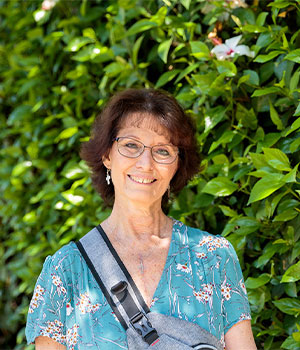First LVAD recipient at UCI Health celebrates one-year anniversary
OC resident first of seven UCI Health patients to receive heart assist device

Elizabeth Vayssie is thriving despite the challenges of becoming Orange County’s first recipient of an implanted heart pump while a pandemic was underway. Today she is celebrating the one-year anniversary of receiving the left ventricular assist device (LVAD) via a Zoom party given by the UCI Health advanced heart failure support group.
The Anaheim resident first learned she had heart failure in July 2019 when she arrived at the UCI Medical Center's emergency room with shortness of breath and a persistent cough she’d been told previously was bronchitis. When she described her other symptoms — tingling, numbness, heavy feeling in her arms and neck, intermittent chest pain, chronic tiredness and abdominal bloating — heart tests were ordered immediately.
The ER team admitted Vayssie to the hospital and she was placed in the care of cardiologist Dr. Dawn Lombardo, founder and director of heart failure services at UCI Health and an expert in women’s heart disease.
Like many patients with heart failure, the 57-year-old human resources professional had chalked up her symptoms to other things. She was shocked by the diagnosis.
Lombardo tried several proven medical therapies to improve Vayssie's heart condition but she was unable to tolerate even the smallest doses of medications due to low blood pressure from her weakened heart.
Her condition rapidly deteriorated. By December, she received a pacemaker to correct a dramatic worsening of her irregular heartbeat. In March 2020, as the world shutdown over COVID-19, her heart was so weak that traditional therapies and symptom management no longer worked.
“Elizabeth was in dire need of an LVAD to support her heart,” says Lombardo.
At the same time, the UCI Health cardiothoracic team was starting its program to begin vascular assist device (VAD) implants in patients with advanced heart failure. The program is headed by cardiothoracic surgeon Dr. Fabio Sagebin, who specializes in advanced heart failure and mechanical circulatory support devices and would perform her surgery.
On April 22, Vayssie received the implant, which successfully took over the pumping action of her heart muscle. She was awake that same afternoon, sitting in a chair by nightfall and discharged less than two weeks later. She returned to work part-time just six weeks after surgery and is now on the heart transplant list at Cedars-Sinai Medical Center in Los Angeles.
“Elizabeth is a positive person and she wanted to get better,” says Sagebin. “We couldn’t have asked for a more ideal patient.”
Finding a new normal
Although Vayssie continues to be the model patient with a giving spirit and can-do attitude, the past year did hold some challenges.
“The LVAD has been working great. The hardest part has been wearing the 10-pound backpack that houses it, but I’ve adjusted,” she says.
In October 2020, she returned to UCI Medical Center for plasmapheresis — a blood plasma exchange to regulate her antibodies and prevent rejection of the LVAD or a potential new heart.
Vayssie says the biggest challenge has been dealing with a type of heart arrhythmia called premature ventricular contractions (PVCs). These extra heartbeats disrupt the regular rhythm and can sometimes cause a fluttering in the chest.
“I was having a million extra heartbeats per week," she says. "The fluttering was making me really tired and the PVCs were constantly setting off alarms and affecting the LVAD pump’s ability to fill completely.”
In January 2021, the doctors adjusted the pump to reduce the alarms but the arrhythmia continued.
The UCI Health cardiovascular team next tried modifying her medications, which made her feel worse. In February, they adjusted her pacemaker to completely take over the beating of her heart. That solved the problem and her energy is steadily returning.
“It’s been hard during the pandemic,” Vayssie admits. “But I think it’s also made it easier for me to rest and take care of my body — to not overdo it because there weren’t many things to do.”
Looking forward
Vayssie has returned to work full-time on a hybrid schedule. Her former company was bought by a multi-national corporation and she’s loving the change.
She also got her second COVID-19 vaccination and feels safer going out in public. She attended Easter services at her church and was finally able to hug her kids and grandkids again.
A life-long Angels baseball fan, she was thrilled to attend opening weekend at the beginning of April.
“I was a little apprehensive that they wouldn’t let me in because of the LVAD backpack, but my UCI Health team wrote a note for me and I made friends with the accessible entry person, so all was well,” she laughs.
“My UCI Health care team is awesome. They are like family to me.”
Grateful for their care, Vayssie likes to pay it forward. She helps lead the Advanced Heart Failure and VAD Support Group and recently signed up to be an ambassador for Abbott Laboratories, which makes LVAD and other heart-assist devices.
“I really feel that I’m still alive today to help other LVAD patients — to share my story and give them hope.”
UCI Health is the clinical enterprise of the University of California, Irvine. Patients can access UCI Health at primary and specialty care offices across Orange County and at its main campus, UCI Medical Center in Orange, California. The 418-bed acute care hospital provides tertiary and quaternary care, ambulatory and specialty medical clinics, as well as behavioral health and rehabilitation services. UCI Medical Center is home to Orange County’s only National Cancer Institute-designated comprehensive cancer center, high-risk perinatal/neonatal program and American College of Surgeons-verified Level I adult and Level II pediatric trauma center and regional burn center. UCI Health serves a region of nearly 4 million people in Orange County, western Riverside County and southeast Los Angeles County. Follow us on Facebook and Twitter.




